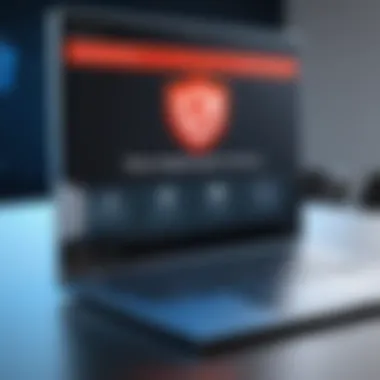Safeguard Your Windows 10: Top Antivirus Programs for Enhanced Cybersecurity


Cybersecurity Threats and Trends
Cybersecurity threats are ever-evolving in the digital landscape, posing significant challenges to individuals and businesses alike. From sophisticated ransomware attacks to complex phishing schemes, the diversity and complexity of cyber threats continue to grow. Emerging trends in cyber attacks underscore the need for robust security measures to safeguard against data breaches and financial losses. Understanding the impact of cyber threats on individuals and businesses is crucial in developing proactive cybersecurity strategies.
Best Practices for Cybersecurity
In the realm of cybersecurity, implementing best practices is imperative to mitigate risks and enhance digital defenses. Strong password management is fundamental in fortifying system security, reducing the likelihood of unauthorized access to sensitive information. Embracing multi-factor authentication adds an extra layer of protection, ensuring secure access to critical systems and data. Regular software updates and patches play a pivotal role in addressing vulnerabilities and strengthening overall security posture. Practicing secure online browsing habits and email practices further augments cybersecurity resilience.
Privacy and Data Protection
Data privacy is a paramount concern in today's interconnected digital ecosystem. Employing data encryption methodologies is essential to safeguarding personal information and preventing unauthorized access. Understanding the risks associated with sharing personal information online is pivotal in maintaining digital privacy. Implementing strategies to safeguard sensitive data and personal details mitigates privacy risks and reinforces data protection measures.
Security Technologies and Tools
Utilizing cutting-edge security technologies and tools is instrumental in fortifying cybersecurity defenses. Key cybersecurity tools and software offer proactive threat detection and mitigation capabilities, bolstering resilience against potential cyber attacks. Antivirus programs and firewalls provide essential layers of protection, scanning systems for malicious content and thwarting unauthorized access attempts. Leveraging Virtual Private Networks (VPNs) ensures secure data transmission and confidentiality, especially in remote work environments.
Cybersecurity Awareness and Education
Enhancing cybersecurity awareness and education is pivotal in empowering individuals to navigate today's digital landscape with confidence. Educating individuals on recognizing phishing attempts equips them with the knowledge to identify and report potential threats effectively. Promoting cybersecurity awareness in the digital age fosters a culture of vigilance and proactive risk management. Accessing resources dedicated to cybersecurity fundamentals enhances education outcomes, equipping individuals with the tools to combat evolving cyber threats effectively.
Introduction
In the realm of cybersecurity, one cannot underestimate the critical importance of utilizing top-notch antivirus programs, especially when operating on Windows 10. These programs serve as the vanguards of digital defense, shielding our systems from a myriad of online threats and malicious intrusions. Throughout this article, we shall navigate through the intricacies of selecting the best antivirus software for Windows 10, shedding light on the nuanced features and functionalities that fortify our cyber bulwarks.
Understanding the Importance of Antivirus Programs
Critical Role in Cyber Defense
The critical role of antivirus programs in cyber defense cannot be overstated. These software solutions act as the frontline soldiers in the relentless battle against digital threats. Their ability to detect and neutralize malicious entities in real-time is a game-changer in safeguarding sensitive data and ensuring the uninterrupted functionality of our digital ecosystems. By offering a proactive approach to cybersecurity, antivirus programs epitomize a cornerstone of digital protection, making them indispensable tools in the contemporary landscape of cyber warfare.
Prevention of Malware Attacks


One of the standout functions of antivirus programs is their prowess in preventing malware attacks. With sophisticated algorithms and heuristic analyses, these programs fortify our systems against insidious malware strains, ensuring that our devices remain impervious to potential cyber contagions. By erecting impenetrable digital ramparts, antivirus software stands as the stalwart defenders of our digital realms, thwarting malicious incursions with unwavering resolve.
Protection of Sensitive Information
Another pivotal aspect of antivirus programs is their role in protecting sensitive information. In an era characterized by rampant data breaches and cyber espionage, safeguarding crucial data has become paramount. Antivirus programs furnish users with a shield of encryption and threat mitigation strategies, ensuring that confidential information remains out of reach of nefarious actors. By prioritizing the sanctity of personal and organizational data, these software solutions foster a climate of trust and security in the digital domain.
Significance of Windows Compatibility
Optimal Performance on Windows
The compatibility of antivirus programs with the Windows 10 operating system holds significant weight in the realm of cybersecurity. Optimal performance on Windows 10 ensures seamless integration and functionality, leveraging the inherent advantages of the operating system to bolster security measures. Users can experience enhanced speed, efficiency, and reliability when their antivirus software harmonizes seamlessly with the Windows 10 architecture, culminating in a superlative cybersecurity experience that is tailored to meet the demands of the contemporary digital landscape.
Integration with System Architecture
Antivirus programs that integrate seamlessly with the system architecture of Windows 10 offer a myriad of advantages. By aligning with the core frameworks and protocols of the operating system, these software solutions optimize resource utilization, minimize conflicts, and enhance overall system stability. The harmonious coexistence of antivirus software with the intricate structures of Windows 10 fosters a symbiotic relationship that elevates the efficiency and efficacy of cybersecurity measures, ensuring comprehensive protection against a spectrum of digital threats.
Enhanced Security Features
The incorporation of enhanced security features in antivirus programs accentuates their efficacy in fortifying Windows 10 environments against cyber vulnerabilities. Advanced functionalities such as real-time threat detection, firewall configurations, and vulnerability scanning contribute towards creating an impregnable digital fortress that repels cyber threats with formidable resilience. By embracing cutting-edge security technologies and methodologies, antivirus programs with enhanced security features emerge as the paragons of digital defense, equipped to navigate the complex terrain of modern-day cybersecurity challenges with steadfast determination.
Top Antivirus Programs for Windows
Antivirus programs play a crucial role in fortifying cybersecurity measures, especially within the realm of the Windows 10 operating system. In this section, we delve deep into the significance of selecting the right antivirus program tailored for Windows 10. By meticulously examining various software options and their distinctive features, readers will gain a profound understanding of how to shield their digital infrastructure against potential cyber threats. From enhancing data security to optimizing system performance, the choice of antivirus software for Windows 10 holds paramount importance in the current digital landscape.
Norton Security
Real-time Threat Detection
Real-time threat detection stands as a pillar in the realm of cybersecurity, offering proactive defense mechanisms against emerging digital threats. Norton Security excels in this aspect by providing a robust real-time threat detection system that constantly monitors system activities for any suspicious behavior. The key characteristic of Norton's real-time threat detection lies in its ability to swiftly identify and mitigate potential risks before they escalate. This feature is highly beneficial for users seeking immediate responses to evolving cybersecurity challenges.
Advanced Firewall Protection
Advanced firewall protection acts as a sturdy shield against unauthorized access attempts and malicious intrusions. Norton Security's advanced firewall feature is designed to fortify system boundaries and regulate data traffic effectively. Its standout characteristic lies in the seamless integration of custom security rules that add an extra layer of defense against diverse cyber threats. Despite its benefits, users may experience occasional system slowdowns due to the intense scrutiny performed by the advanced firewall protection.


Secure VPN Integration
The integration of a secure Virtual Private Network (VPN) within Norton Security bolsters data encryption and privacy measures, especially when accessing sensitive information online. By routing internet traffic through encrypted tunnels, Norton's secure VPN integration safeguards user data from prying eyes and potential cyber attacks. The unique feature of split-tunneling offered by the VPN ensures that users can selectively decide which data traffic is encrypted, enhancing both security and user control. However, the reliance on VPN services can sometimes lead to decreased internet speeds.
Bitdefender Antivirus Plus
Stay protected against evolving ransomware threats with Bitdefender Antivirus Plus and its multi-layer ransomware protection feature. This defense mechanism operates on multiple levels, ensuring that ransomware attacks are swiftly identified and thwarted before any damage is done. The key characteristic of Bitdefender's multi-layer protection is its proactive approach to ransomware, which goes beyond traditional antivirus methods to safeguard critical data from encryption attempts.
Phishing and Fraud Prevention
In the digital age, phishing and online fraud pose significant threats to digital security. Bitdefender's antivirus solution includes advanced mechanisms for detecting and blocking phishing attempts, thereby safeguarding users from falling prey to fraudulent schemes. The key characteristic of Bitdefender's phishing and fraud prevention lies in its real-time analysis of website authenticity and user behavior to identify potential threats accurately. This feature enhances user confidence in navigating the web securely, although it may occasionally lead to false positive alerts.
Privacy Firewall
Securing your digital privacy is paramount in today's interconnected world. Bitdefender's antivirus plus integrates a privacy firewall that empowers users to control data sharing and minimize unauthorized access to sensitive information. The privacy firewall's key characteristic lies in its granular settings, allowing users to tailor privacy configurations according to their specific needs. While this feature enhances overall data protection, complex configurations may confuse less tech-savvy users.
Kaspersky Total Security
Enhance your cybersecurity posture through Kaspersky Total Security's multifaceted features, including the Safe Money feature. This unique component isolates financial transactions within a secure environment, shielding users from potential online payment fraud. The key characteristic of Kaspersky's Safe Money feature is its secure browser mode, which creates a walled garden for financial activities, isolating them from potential malware or spyware infiltration.
Parental Controls
In an age where digital threats extend to online content, Kaspersky Total Security offers robust parental control features to safeguard children's online experiences. The key characteristic of Kaspersky's parental controls is the versatility it offers parents in monitoring and managing their children's digital interactions. This feature provides a comprehensive suite of tools, including web filtering and screen time management, to foster a safe online environment for minors. While effective, parental controls may occasionally block legitimate content due to overzealous filtering protocols.
Identity Protection
Protecting personal and financial information is paramount in today's digital landscape. Kaspersky's identity protection feature shields user identities from theft and misuse through comprehensive monitoring and alert systems. The key characteristic of this offering is its proactive identity theft prevention measures, which encompass real-time data monitoring and immediate breach notifications. While effective, the continuous monitoring processes may incur slight system resource overhead.
McAfee Total Protection
Cross-device security is paramount in an era where digital interactions transcend traditional boundaries. Mc Afee Total Protection excels in this aspect by providing comprehensive security measures across multiple devices, ensuring a seamless and secure digital experience. The key characteristic of McAfee's cross-device security lies in its centralized management console, offering users a holistic view of their security status across various platforms.
Password Manager


In the age of numerous online accounts, password security is a significant concern for users. Mc Afee's password manager feature streamlines the process of securely storing and managing passwords by generating complex and unique credentials for each online account. The key characteristic of McAfee's password manager is its synchronization across devices, enabling users to access their credentials securely from anywhere. Despite its convenience, heavy reliance on a password manager can increase vulnerability in case of a master password breach.
File Shredder
Securely deleting confidential files is crucial in preventing data breaches and unauthorized access to sensitive information. Mc Afee's file shredder feature ensures data confidentiality by permanently deleting files beyond recovery. The key characteristic of McAfee's file shredder is its compliance with various data deletion standards, guaranteeing thorough and secure eradication of files. However, users should exercise caution as file shredding is irreversible and may lead to accidental loss of crucial data if not done attentively.
Factors to Consider When Choosing an Antivirus Program
When delving into the realm of cybersecurity and selecting an antivirus program tailored for Windows 10, various essential elements come into play. The significance of choosing the right antivirus program cannot be overstated, as it forms the frontline defense against potential cyber threats. Factors such as performance impact, security features, and user-friendly interface play a pivotal role in determining the effectiveness of the antivirus software. By carefully considering these aspects, users can ensure comprehensive protection for their digital assets and data.
System Resource Usage
System resource usage, a critical aspect of antivirus programs, directly impacts the overall performance of the system. It involves how efficiently the software utilizes CPU, memory, and disk space while running scans and real-time protection processes. Optimal system resource usage ensures that the antivirus program operates smoothly in the background without significantly slowing down the system's performance. This efficient utilization of resources contributes to a seamless user experience, making it a preferred choice for enhancing cybersecurity on Windows 10.
Scanning Speed
The scanning speed of an antivirus program determines how quickly it can scan files and detect potential threats within the system. A fast scanning speed is crucial for promptly identifying and neutralizing malware, reducing the risk of infections spreading throughout the system. Antivirus programs with high scanning speeds offer quick response times to emerging threats, enhancing the overall security posture of the system. However, overly fast scanning speeds may impact system resources, striking a delicate balance between thorough scanning and system performance.
Background Processes
Background processes in an antivirus program refer to the tasks and operations that run silently behind the scenes to ensure continuous protection. These processes include real-time scanning, automatic updates, and threat detections without user intervention. Effective background processes are essential for maintaining robust security measures without disrupting the user experience. While these processes enhance the proactive defense mechanism of the antivirus software, excessive background activities may lead to system sluggishness. Striking the right balance in background processes is crucial for optimizing security without compromising system performance.
Conclusion
Enhancing cybersecurity in the realm of Windows 10 antivirus programs is paramount to safeguarding digital assets effortlessly. In this techno-savvy era, the conclusion emphasizes the necessity of adopting a proactive approach towards digital security. Regular updates and scans play a pivotal role in maintaining a stalwart defense mechanism against evolving cyber threats. By instigating these security measures, users can significantly reduce vulnerability to malicious attacks and ensure the longevity of their digital ecosystem. Prioritizing regular updates and scans not only enhances the overall efficiency of antivirus software but also fortifies the shield protecting sensitive data and systems.
Ensuring Comprehensive Protection on Windows
Regular Updates and Scans
When discussing the quintessence of regular updates and scans, securing data integrity and system reliability take precedence. Incorporating the automated regimen of regular updates and scans provides users with a preemptive strike against new and emerging cyber perils. The fundamental characteristic of this practice lies in its ability to fortify the antivirus program's core database with the most recent threat definitions and security patches. This proactive approach ensures that the antivirus software remains one step ahead in identifying and neutralizing potential risks promptly. However, a minor downside of frequent updates and scans may result in nominal system resource consumption, impacting device performance marginally but ensuring comprehensive protection.
Safe Browsing Practices
Safe browsing practices epitomize the cornerstone of cybersecurity hygiene in the digital landscape. By adhering to judicious online conduct and promoting digital literacy, users can erect a robust defense line against malware and phishing attempts. The fundamental essence of safe browsing practices lies in cultivating a vigilant mindset while traversing the vast expanse of the internet. Implementing secure browsing protocols, such as avoiding suspicious websites and scrutinizing URL authenticity, significantly mitigates the likelihood of falling victim to cyber assailants. Despite enhancing online safety, stringent safe browsing practices may potentially impede unrestricted web exploration, restricting user freedom to some extent while guaranteeing a secure digital expedition.
Data Backup Strategies
Data backup strategies epitomize the quintessence of disaster recovery and data resilience. By devising comprehensive backup mechanisms, users can shield themselves from catastrophic data loss incidents and system failures. The inherent characteristic of data backup strategies revolves around creating redundant copies of critical information in secure offsite locations or cloud repositories. This proactive stance ensures that vital data remains impervious to accidental deletions, hardware malfunctions, or malicious tampering. Nonetheless, an apparent drawback of data backup strategies pertains to the associated financial costs and storage space considerations. While offering an invaluable safety net for critical data, backup strategies necessitate prudent resource allocation and periodic maintenance to guarantee efficacy in mitigating data risks.







